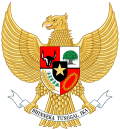Burhanuddin Harahap Cabinet Kabinet Burhanuddin Harahap | |
|---|---|
| 16th Cabinet of Indonesia | |
| 1955–1956 | |
 | |
| Date formed | 12 August 1955 |
| Date dissolved | 24 March 1956 |
| People and organisations | |
| Head of state | Sukarno |
| Head of government | Burhanuddin Harahap |
| No. of ministers | 23 ministers |
| Member party | Masyumi Democratic NU PSI Catholic Labour PRN PIR-Hazairin (PRI) Parkindo Independent |
| Opposition party | PNI PIR-Wongsonegoro (SKI) Progressive PKI |
| History | |
| Predecessor | Ali Sastroamidjojo I Cabinet |
| Successor | Ali Sastroamidjojo II Cabinet |
| ||
|---|---|---|
Pre-independence Domestic policy Foreign policy Family Media and legacy | ||
The Burhanuddin Harahap Cabinet (Indonesian : Kabinet Burhanuddin Harahap) was an Indonesian cabinet, named after the prime minister, that served from 12 August 1955 until 24 March 1956.

